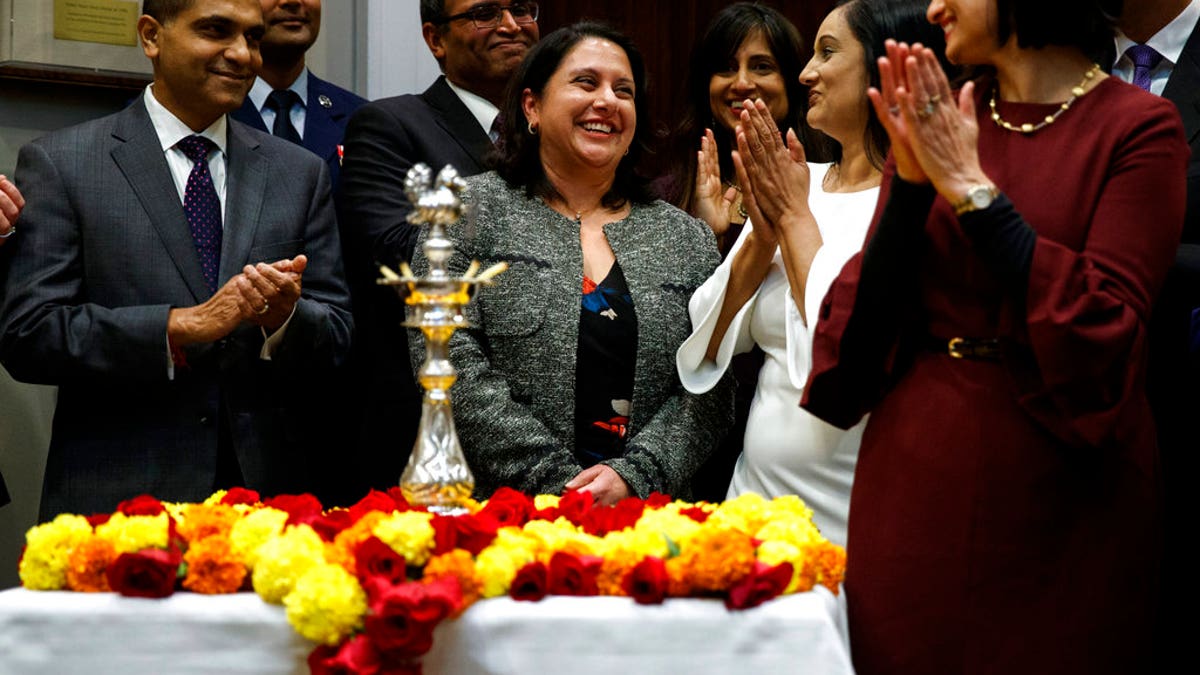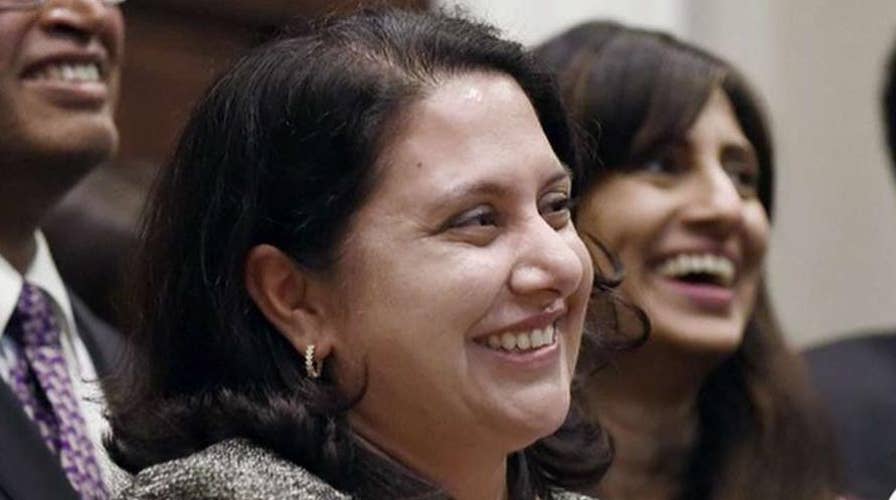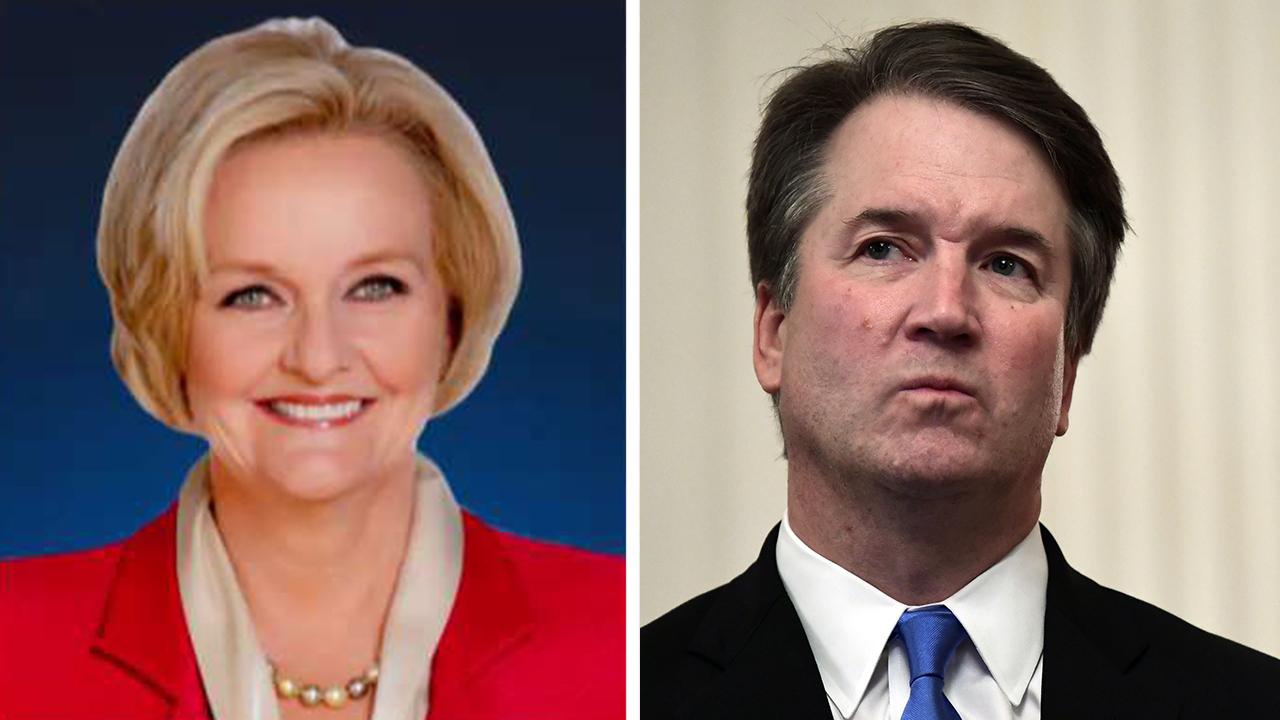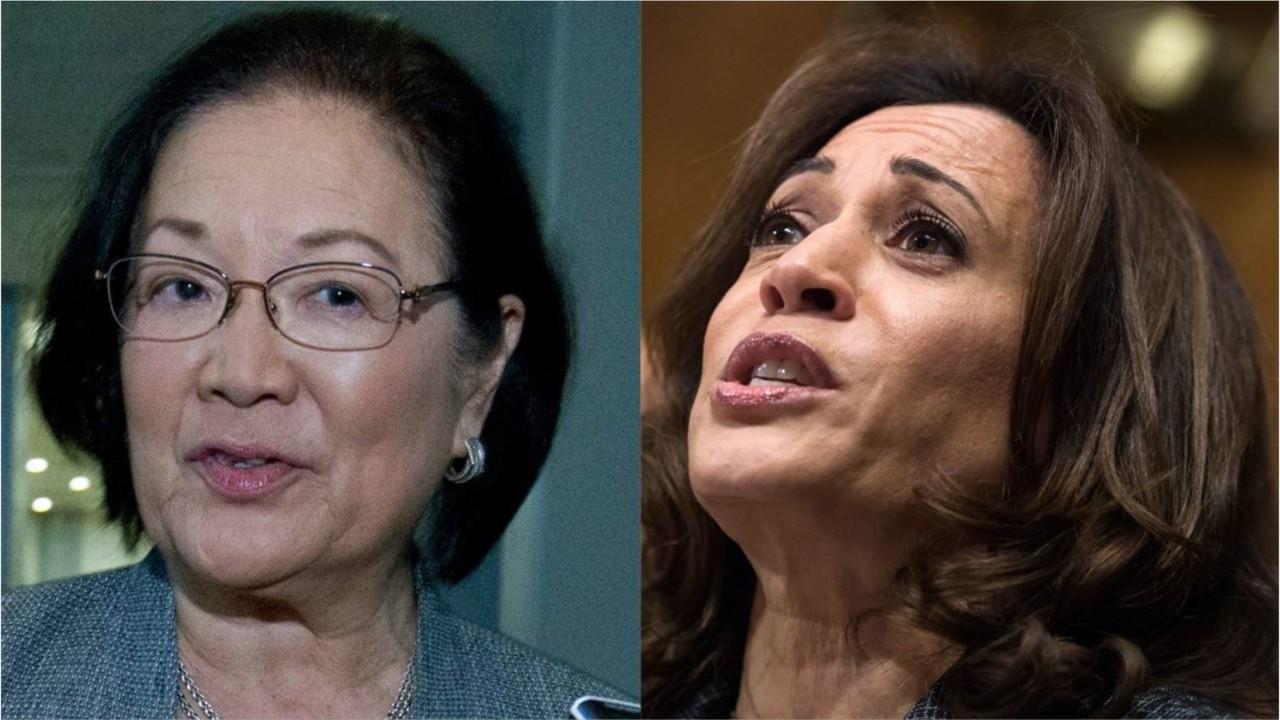Judicial nominee Neomi Rao may get 'Kavanaugh treatment'
Trump judicial nominee facing growing scrutiny; reaction from Sens. Amy Klobuchar and John Kennedy.
Conservative politicians, legal experts, and activist groups are rushing to the all-out defense of President Trump's D.C. Circuit Court of Appeals nominee Neomi Rao, after a freshman Republican senator suggested he might vote against her confirmation because she may harbor pro-choice views.
Rao, who would take now-Associate Justice Brett Kavanaugh's vacated seat on the nation's most influential appellate court, was questioned earlier this month by Republicans on the Senate Judiciary Committee concerning her past writings that implied intoxicated women might share some blame if they are raped. The defection of even a handful of conservatives could sink Rao's confirmation in the Senate, where Republicans hold a slim 53-47 majority.
Missouri Republican Sen. Josh Hawley told Axios over the weekend that he had "heard directly from at least one individual who said Rao personally told them she was pro-choice." Hawley clarified: "I don't know whether that’s accurate, but this is why we are doing our due diligence."
Rao, 45, currently serves as administrator of the White House Office of Information and Regulatory Affairs, and observers have said she's played a key role in executing the Trump administration's deregulation agenda. She would be the first South Asian woman to serve on a federal appeals court.
WATCH: RAO SCHOOLS CORY BOOKER AFTER FLAMEOUT QUESTION ON LGBTQ LAW CLERKS
However, Rao has never tried a case in state or federal court, and some of her writings -- including as a professor at the George Mason University School of Law, later renamed the Antonin Scalia Law School -- are leading conservatives to raise last-minute concerns.
“Josh Hawley is single-minded and focused only on representing the commonsense conservative voters of Missouri. No threat from any group in Washington on either side of the aisle matters to him.” Hawley spokeswoman Kelli Ford told Fox News in a statement.

Freshman Missouri Republican Sen. Josh Hawley has suggested he might vote against Neomi Rao, President Trump's replacement for Brett Kavanaugh on the D.C. Circuit Court of Appeals. (AP Photo/Jeff Roberson, File)
According to Hawley, Rao's academic writings have indicated she may support the concept of "substantive due process," a legal framework that identifies constitutional rights not expressly provided by the text of the Constitution. Conservatives fiercely have opposed the use of substantive due process to provide for some rights, including the right to privacy and abortion, which are not stated in the constitutional text but instead are purportedly implied by it.
For example, in a 2011 Notre Dame Law Review article, Rao referred to the "anti-abortion movement," rather than the pro-life movement. Rao, describing other courts' reasoning and not necessarily her own, also discussed the principles that liberals say justify a constitutional right to abortion.
“Constitutional courts frequently suggest that dignity requires the right to a certain degree of individual autonomy, a space for freedom of action without interference by the state," Rao wrote. "These decisions suggest that providing a wide sphere of autonomy and ensuring a minimum of state interference with property, bodily integrity, and privacy enhances intrinsic dignity.”
Rao went on to call for more legal clarity on the topic: “In the existing confusion, it may be desirable for liberty (not to mention clarity) to take dignity talk out of our constitutional law. But if, as I suspect, dignity cannot be extricated, in partbecause of the established pull of the word, then we need clarity about what dignity means."
On Monday, in a reference to substantive due process, Hawley said that "the implied fundamental rights cases are where the courts just make stuff up," and that he will press "every" judicial nominee on the issue.
OPINION: I WAS NEARLY RAPED, AND I SUPPORT RAO
"I am only going to support nominees who have a strong record on life," Hawley told Axios. "To me, that means ... someone whose record indicates that they have respect for what the Supreme Court itself has called the interests of the unborn child; someone whose record indicates they will protect the ability of states and local governments to protect the interests of the unborn child to the maximum extent ... and number three somebody who will not extend the doctrines of Roe v. Wade and Casey, which I believe are deeply incompatible with the constitution."
Roe v. Wade and Planned Parenthood v. Casey were the seminal Supreme Court cases to find and define a constitutional right to an abortion. But, conservatives and legal scholars are aggressively pushing back on Hawley's concerns this week, saying variously that there is no evidence that Rao is pro-choice -- and some are suggesting that even if she supports abortion rights, her personal views should not bar her from judicial service.
Carrie Severino, the Chief Counsel and Policy Director at the conservative Judicial Crisis Network, accused Hawley of continuing the policies of the Democrat he defeated last November, then-Sen. Claire McCaskill.
"Sadly, barely a month after moving to Washington, Josh Hawley is already acting like Claire McCaskill when it comes to judges," Severino said. "Instead of supporting President Trump's top judicial nominee, he is spreading the very same kind of rumors and innuendo and character assassination that Republican leaders fought during Justice Kavanaugh’s confirmation. Hawley could be working to confirm her and other extraordinary nominees, but it seems he’d rather be making headlines.”
Columnist Quin Hillyer, meanwhile, wrote in The Washington Examiner that Hawley's approach was a "dicey" push for a judicial litmus test.
"Conservatives have argued long and correctly that professional qualifications and personal integrity, along with a basic commitment to the Constitution itself, should be the only determinants of nominees’ fitness for appointment to federal judgeships," Hillyer wrote. "In particular, conservatives have inveighed against any result-oriented, single-issue litmus tests for judges, especially for those below the level of the Supreme Court."

Neomi Rao smiling as President Trump announced his intention to nominate her to fill Brett Kavanaugh's seat on the U.S. Court of Appeals for the D.C. Circuit last November. (AP Photo/Evan Vucci, File)
In a statement, Club for Growth President David McIntosh praised Rao as an "originalist who is faithful to the Constitution," citing her work on deregulation in the Trump White House. McIntosh, whose organization is devoted to reducing taxes, also exalted Rao's "extensive knowledge of administrative rulemaking."
“I have known Neomi for decades and have no doubt that she will be a principled jurist, cut from the same cloth as Justices Scalia and Thomas,” McIntosh said. "Senate Republicans should not be thrown off track by rumors and innuendo."
LESSONS FROM RAO HEARING -- DEMS ARE CLUELESS ABOUT WOMEN
In a barrage of similar statements, other conservative luminaries lined up to defend Rao. Ed Meese, the former attorney general under President Ronald Reagan, said he also personally knew Rao and could vouch for her commitment to constitutional principles.
"I have had the privilege of knowing Professor Neomi Rao, and have observed her work, since she first started teaching at the Scalia Law School at George Mason University," Meese said. "She has made it her life's work to support the Constitution as it is written, and she understands the proper judicial role in our society and what that requires of judges when they are interpreting the Constitution and the laws. I have no doubt that she will uphold the rule of law and not legislate from the bench."
Ralph Reed, the chairman of the nonprofit Faith and Freedom Coalition, which focuses on outreach to evangelicals, said he supported Rao's confirmation and asserted that "her judicial philosophy is antithetical to federal judges issuing rulings untethered from the enumerated rights found in the Constitution."
Conservative groups also have ramped up spending with hundreds of thousands of dollars in media outreach to promote Rao, whose rocky confirmation hearing already gave some analysts cause for alarm. Democrats hammered Rao for working to kill regulations they helped champion, while Republicans questioned her past writings on sexual assault.
In a 1994 opinion column, Rao wrote: "Unless someone made her drinks undetectably strong or forced them down her throat, a woman, like a man, decides when and how much to drink. And if she drinks to the point where she can no longer choose, well, getting to that point was a part of her choice."
A good way to avoid a potential rape "is to stay reasonably sober," Rao added.
"To be honest, looking back at some of those writings ... I cringe at some of the language I used," Rao told the Senate Judiciary Committee earlier this month, adding that writings in which she criticized affirmative action and suggested that intoxicated women were partly responsible for date rape did not reflect her current thinking.
"I like to think I've matured as a thinker, writer and indeed as a person," she said.
Sen. Joni Ernst, R-Iowa, who recently revealed she was raped by her boyfriend in college, said Rao's writings "give me pause," in part because of the message they've sent to young women who may be reluctant to report a rape.
Fox News' Alex Pappas and The Associated Press contributed to this report.







